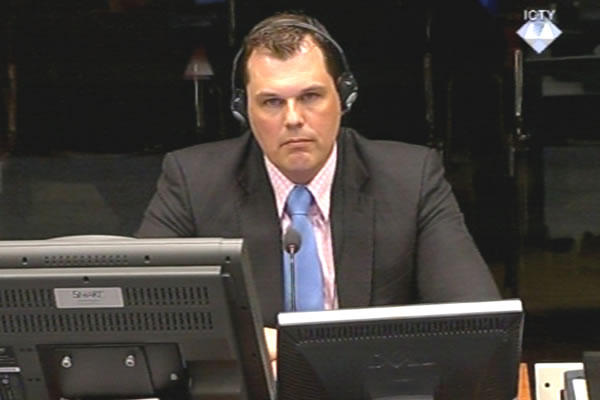Home
MLADIC DEFENDS HOLLAND
A former soldier who served in the UN Dutch Battalion in Srebrenica described how General Mladic told him in Potocari on 12 July 1995 that in 10 years’ time, the Army of Republika Srpska will have to defend Holland against Muslim
 Leendert van Duijn, witness at the Ratko Mladic trial
Leendert van Duijn, witness at the Ratko Mladic trial At Ratko Mladic’s trial, the judges admitted into evidence parts of the evidence Leendert van Duijn gave at the trial of the seven VRS officers charged with the Srebrenica genocide. Van Duijn, now a police commissioner in the Dutch national police, served in UNPROFOR’s Dutch Battalion in the summer of 1995, when the Battalion was stationed in Srebrenica. At that time, Mladic’s troops overran the enclave under UN protection.
When the prosecutor read out the summary of his statement, Van Duijn confirmed that on 12 and 13 July 1995 he and other soldiers from his unit tried to help the refugees from Srebrenica in Potocari. The refugees had sought shelter near the Dutch Battalion compound there. Van Duijn confirmed that he saw men being separated from the rest of the population and detained in the white house. Also, the witness described the meetings with Mladic. In Van Duijn’s words, Mladic told him it was not safe to have people of other races and religions in his unit. Mladic said that ’10 years from now he will come to Holland with his army to protect other races against Muslims’, the witness recounted.
On 13 July 1995, Van Duijn went to the ‘white house’ where the men were detained. On the lawn in front of the house he saw a pile of personal belongings: clothes, bags, documents and passports. A man from the VRS special police called Mane explained to Van Duijn that the men would be held there for a time in order to be checked against the lists of war crime suspect. Van Duijn asked Mane how their identity could be established without documents. Mane told him, ‘they will not need their passports any more’. After that ‘ominous’ statement, Van Duijn realized that the fate of detained Muslims was ‘darker than I thought’.
In the cross-examination Mladic’s defense counsel Dragan Ivetic tried to get Van Duijn to help him find alternative explanations for Mane’s answer. The defense counsel put it to the witness that those passports were old and void SFRY travel documents. That was why they were thrown away like that and why they ‘will not need them anymore’, the defense counsel argued.
Van Duijn agreed that the enclave under UN protection hadn’t been entirely demilitarized. There weren’t enough ‘blue helmets’ in the enclave and they were ill-equipped, he explained. Partly this was the consequence of the Bosnian Serbs not allowing the convoys with equipment and staff to pass through to Srebrenica.
Presiding judge Orie asked the witness to be more specific as to what the ‘blue helmets’ were supposed to do about demilitarization. UNPROFOR’s mandate wasn’t to demilitarize the enclave, Van Duijn said: the Dutch Battalion soldiers had to ‘disarm every person carrying arms they encountered’. Van Duijn admitted that he personally didn’t do it when he encountered Naser Sabanovic. As he explained, Sabanovic was one of the ‘local commanders’ in the BH Army. This prompted the judge to intervene and note that the demilitarization implied not only disarming but also ‘the prohibition of the existence of any military formations in the enclave’. Van Duijn said that it was ‘very difficult to distinguish between civilians and fighters’ in Srebrenica. Van Duijn continues his testimony tomorrow.
Linked Reports
- Case : Mladic
- 2013-04-24 UNPROFOR WAS DECEIVED
- 2013-04-23 DID THE DUTCH ‘DECLARE WAR’ ON MLADIC’S TROOPS?
- 2013-04-19 ‘WOLVES’ AND ‘SCORPIONS’ AT RATKO MLADIC’S TRIAL
- 2013-04-26 ONLY EXECUTION VICTIMS WERE BURIED IN SREBRENICA GRAVES
- 2013-05-01 DID THE WITNESS SEE THE KILLING IN POTOCARI?
- 2013-05-02 UNPROFOR’S MISJUDGMENT AND FEARS
